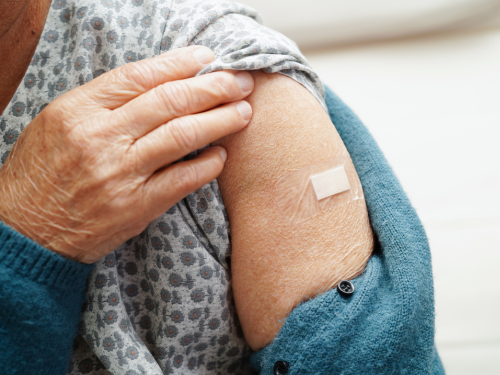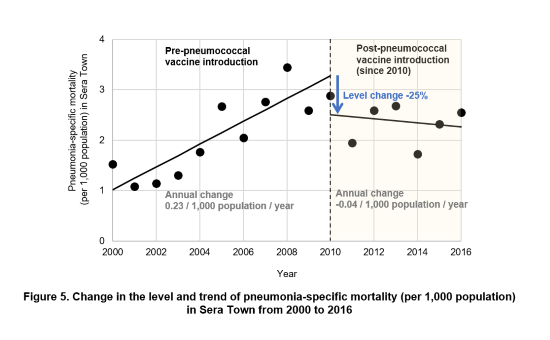Findings based on efforts in Sera Town, Japan showed the pneumococcal vaccination support program reversed the previously increasing trend in pneumonia mortality rate in the community.

(Canva)
A research team has evaluated the real-world impact of a community-based pneumococcal vaccination support program for older adults conducted in Sera Town, Hiroshima Prefecture, Japan.
Their work is published in the Journal of Epidemiology on May 5, 2025.
Pneumonia is one of the leading causes of death in Japan. Each year about 74,000 people die from pneumonia with 98 percent of these deaths occurring in people aged 65 and older. The bacteria Streptococcus pneumoniae is the primary cause of pneumonia.
In October 2014, Japan began a nationwide routine vaccination program for the elderly under the National Immunization Program with the 23-valent pneumococcal polysaccharide vaccine (PPSV23).
Sera Town, a mountainous municipality in eastern Hiroshima Prefecture, jointly planned and implemented a pneumococcal vaccination support program with a research team at Hiroshima University in October 2010-well before the nationwide rollout. The program, which ran until March 2015, aimed to promote community health and provided PPSV23 vaccination to all residents aged 65 and older. The vaccine used in the project was approved in Japan at the time for elderly individuals. As part of this collaborative initiative, a five-year follow-up survey was conducted to assess the vaccine's preventive effect against pneumonia.
"Specifically, we sought to understand the impact of the PPSV23 vaccine on pneumonia incidence and mortality among the elderly population in a rural setting with a high aging rate," said Aya Sugiyama, a lecturer in the Department of Epidemiology Disease Control and Prevention at the Graduate School of Biomedical and Health Sciences, Hiroshima University. The Sera Town residents who took part in the project ranged in age from 70 to 114 years old, with a median age of 84.
To assess changes in mortality following the introduction of the vaccination program, the researchers used aggregated demographic data from Japan's vital statistics covering the years 2000 to 2016. They applied an interrupted time series analysis to quantify the level and trend changes in mortality rates over time, specifically looking at the mortality rates before and after the vaccination project was introduced in the town. The study aimed to generate real-world evidence on the effectiveness of vaccination support programs in super-aged societies.
Their analysis of the data showed them that the pneumococcal vaccination support program for older residents in Sera Town was associated with a 25 percent reduction in pneumonia-related mortality. "Notably, it reversed the previously increasing trend in pneumonia mortality in the community," said Sugiyama.
Impact of pneumococcal vaccination support program on pneumonia mortality
Quantitative evaluation using interrupted time series analysis based on population-level mortality data in Sera Town, Hiroshima Prefecture, Japan (2000-2016). (© 2024 Aya Sugiyama et al., Journal of Epidemiology, CC BY 4.0)
The study also provided valuable data on the actual incidence of pneumonia among vaccinated older adults, with an incidence rate of 20.3 cases per 1,000 person-years. Scientists use the person-year method in studies where they follow individuals over a period of time. A person-year is one person being followed for one year. "These findings underscore both the public health significance of local vaccination efforts and the burden of pneumonia in aging populations," said Sugiyama.
The research team sees the findings as particularly relevant for Japan, which has the most aged population in the world. "With the completion of this evaluation, the next step is to share these findings to inform future discussions on community-based vaccination strategies. While further research is needed, we hope that our results will serve as a reference for regions exploring effective approaches to pneumonia prevention in older adults," said Sugiyama.
The research team includes Aya Sugiyama, Kanon Abe, Hirohito Imada, Bunlorn Sun, Golda Ataa Akuffo, Tomoyuki Akita, Shingo Fukuma, Junko Tanaka, and Noboru Hattori from Hiroshima University; Masaaki Kataoka from Sera Central Public Hospital; and Kentaro Tokumo from Sera Central Public Hospital, Hiroshima University, and Hiroshima University Hospital.
The research is funded by the Sera Town municipality.
This paper received partial funding from Hiroshima University to cover open access fees.
About the study
Journal: Journal of Epidemiology
Title: Association Between Introduction of the 23-valent Pneumococcal Polysaccharide Vaccine (PPSV23) and Pneumonia Incidence and Mortality Among General Older Population in Japan: A Community-based Study
Authors: Aya Sugiyama, Masaaki Kataoka, Kentaro Tokumo, Kanon Abe, Hirohito Imada, Bunlorn Sun, Golda Ataa Akuffo, Tomoyuki Akita, Shingo Fukuma, Noboru Hattori & Junko Tanaka







